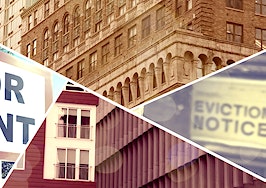When Mario Salerno decided last month to waive April rent for his roughly 200 Brooklyn tenants, he did it with a letter taped to the outside of his building.
“Due to the recent pandemic of coronavirus COVID-19 affecting all of us, please note I am waiving rent for the month of April 2020,” the letter stated, according to an initial report on the situation from Greenpointers.
Salerno’s move garnered widespread media attention and praise, turning him into one of the many local heroes that have emerged during the crisis. But the case also raises questions about the best ways for landlords to interact with tenants during the crisis, particularly those who may end up not paying their rent during the ongoing pandemic.
(Inman called Salerno’s gas station but was not able to immediately reach him for an interview.)
To pin down the best practices in these kinds of situations, Inman spoke with a number of experts on real estate and tenant law. And while Salerno’s taped-up letter might have been effective in his case, the overwhelming consensus was that for landlords offering some sort of leeway or deferment, the best thing to do is get documentation from tenants about their situations, and to formalize an agreement for how to repay rent.
(It’s also worth noting that this post is not legal advice and landlords with specific questions should reach out to their own attorneys.)
Get documentation
Before Salerno gave his tenants a break, Ben Caballero made headlines after tweeting that he was suspending all late fees and evictions for people impacted by the pandemic.

Ben Caballero
Caballero — who is consistently ranked the top real estate agent in the U.S. — told Inman Friday that he rents out about 60 homes. Virtually all the tenants ultimately paid their April rent, meaning Caballero hasn’t yet needed to formalize a deferment program. But when he does, he said tenants will need to submit some proof that the pandemic is affecting them in some way.
“We were thinking in terms that they would have some kind of medical statement,” he explained.
Aviv Tuchman, an attorney in Los Angeles who focuses on real estate, said that kind of documentation is key.
“I would recommend the tenant provide some type of documentation or proof that they are unable to pay the rent,” he told Inman. “A termination notice, a filing for unemployment, maybe a note from a doctor.”
Get an agreement in writing
Many landlords can’t simply excuse their tenants rent the way Salerno did because they have their own expenses to pay.
“For mom-and-pops it can be very daunting because they have to pay the property taxes,” Tuchman said. “And they have mortgages. So they should try to work with the tenants to get the rent paid.”
For landlords in that situation, Tuchman recommended creating a document that specifies what a tenant is paying and when, and which notes that rent is not altogether forgiven.
“I think that there should be some type of writing,” he said. “There should be an amendment.”

Alexandra Alvarado
Alexandra Alvarado, a spokesperson for the American Apartment Owners Association (AAOA), offered similar advice.
“Definitely put it in writing,” she told Inman. “Everything should be in writing.”
Alvarado said that landlords who give their tenants a break should also stipulate what kind of repayment plan they’re offering. For example, if they want tenants to pay back rent over a period of six months, that detail should be spelled out. The idea is that if the case eventually ends up in court, documentation will prove an agreement was in place.
She also said landlords should get tenant signatures.
“The safe way to do it would be to at least get a signature from the tenant that would state the repayment plan terms,” she said. “I think having an actual signature on a payment plan is going to be the best way to go about it.”
This may seem like a burdensome process for typically more informal mom-and-pops, of which there are millions in the U.S. But Tuchman said that without clear documentation, landlords risk having tenants misinterpret the amount of leeway they have.
He also recommended landlords consult an attorney to get effective contract amendments. In a pinch, an email chain between a landlord and a tenant might also do. But both he and Alvarado said that phone calls between landlords and tenants are not enough.
Additionally, Tuchman suggested updating contract amendments each month as the crisis unfolds, and said that landlords should strive to “be civil in their approach.”
The scope of the issue
So how many landlords might find themselves needing to create contract amendments in the coming months?
In a word, lots.

Credit: AAOA
According to an AAOA survey of 1,000 landlords from last month, 54 percent had heard from tenants who said they wouldn’t be able to pay April rent.
Additionally, the National Multifamily Housing Council (NMHC) revealed earlier this week that nearly a third of renters missed their payments in April, up from less than 20 percent who missed payments in March.
Anecdotal evidence also indicates the issue is widespread. Tuchman said, for example, that he has been “very busy” lately helping landlord clients. And Alvarado said that a recent AAOA webinar on these issues had about 6,000 attendees.
Significantly, the AAOA survey also revealed that 67 percent of landlords are willing to offer rent deferment to tenants who need it. That finding suggests that despite widespread economic anxiety, people are cognizant that those around them are suffering — and they’re willing to be flexible.
“Everyone is affected in some way,” Tuchman ultimately concluded. “From both landlord and tenant standpoint, it’s important to keep the dialog open.”
Additional resources:
The AAOA has a two part webinar series for landlords that can be accessed here and here.
The NMHC has also compilied resources for landlords and property managers.
Additionally, Inman has a state-by-state guide to eviction moratoriums.





